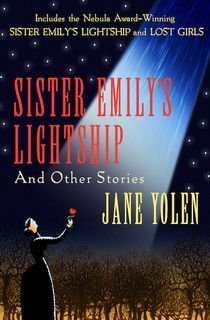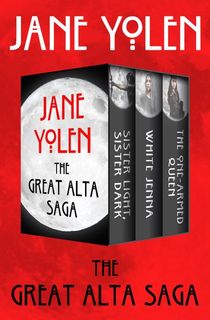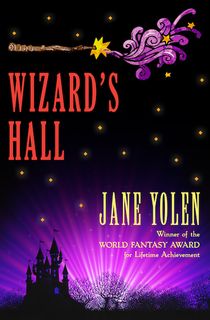When talking about fantasy, and fairy tales in particular, it’s impossible for Jane Yolen not to come to mind. The author or editor of over 350 books, Yolen has been a published writer since her early 20s. Some of her most notable works include The Devil’s Arithmetic (1988), Briar Rose (a 1992 Nebula Award finalist), and her How Do Dinosaurs Say…? series—which began with How Do Dinosaurs Say Goodnight? in 2000.
Now, the fantastic author has received the prestigious Damon Knight Grand Master award, which she’ll receive in person at the Nebula Awards this week. We had the pleasure of speaking with Yolen about how it feels to be officially listed among the greats, what draws her to fairytales, and the most fulfilling aspects of being an author.
Congrats on being selected as the Science Fiction and Fantasy Writers of America’s [SFWA] Damon Knight Grand Master for 2016! What contributions to the genre do you think landed you such a prestigious honor?
First, it came as a total shock. To be on the same list with such amazing writers as Le Guin, Asimov, Delany, Clark...is to feel truly small and yet somehow large at the same time.
At a guess, three things probably landed me there. First, I have over 350 books published, and well over a hundred stories and novellas published—and well, perhaps 1,000 poems published. The greater number [of those works] is in the fantasy column; a few are distinctively SF; and, there are a couple of horror things as well. [Within these genres there are] adult novels, children’s novels, pedagogical books and articles about writing fantasy, fantasy anthologies, collections, graphic novels, and picture books.
Second, I’ve won a bunch of major awards—including the Nebula twice. All of which I’m gobsmacked about. (Though the Skylark Award from Boskone set my good coat on fire, which wasn’t the best way to celebrate the award.)
And third, I was president of SFWA for two years, which might have helped.
You’ve now joined the ranks of authors including Samuel Delany, Ursula K. Le Guin, Clifford D. Simak, and many other impressive science fiction authors. How does it feel to have been selected, and what advice do you have for others who dream of being compared to the greats someday?
Don’t worry about being great or even semi-great; in fact, don't worry about rankings at all. That’s fairy dust. You have no control over any of it. Just write the damn book, tell the damn story, fiddle the damn poem.
Want more authors? Sign up for The Portalist's newsletter!
Your work with fairy tales has often been compared to that of Hans Christian Andersen and Aesop. What draws you to fairy tales? And is there one in particular that you cherished as a child (or still do, today)?
I began with fairy tales and they have threaded through my life, telling me my own personal story along the way. They are protean and can serve us at any age and in any age. In fact, I have a Holocaust novel coming out next spring, Mapping the Bones, built on the armature of Hansel and Gretel. And yes, there is an oven.
As for the stories I loved most as a child: Little Brother, Little Sister (Russian), because I had (still have) a beloved brother I always felt (still do) protective of; Vassilisa the Beautiful (Russian), where I discovered my culture hero for the first time—Baba Yaga; and Faithful John (Grimms), in which the titular faithful servant speaks truth to power even though he knows it will be his death. And so started my life as a political activist and fifteen years as a Quaker.
You’ve said before, “The best awards are when young readers love my books.” Is the most fulfilling part of being an author the ability to influence someone, especially a child, in a positive way?
Absolutely. If a story helps the reader or somehow changes him/her, what could be better? If the change is laughter, or perhaps tears, or a major shift in perspective—it doesn’t matter. My job is well done. Whether the readers remember me is not important, but if they remember the story, I am graven in stone.
We love your book, Sister Light, Sister Dark—the fantasy coming of age story about a warrior woman and her dark twin. Where did you get the idea for this story, and how do you think it resonates with young readers today?
It began as a short story for an anthology edited by Jessica Amanda Salmonson about warrior women. And when I’d finished, I knew I wanted to stay in the world of The Dales a bit more. And then a bit more. And then, even a bit more before I was replete. When I looked around, to my surprise, there were three linked novels about Great Alta and the women she brought into her fold.
I am not sure the books resonate today if only because they aren’t easy to find. But I would think that now—at a time of upheaval, when women are being once again shoved back into the Mommy closet or the "kinder und küche crèche," perhaps the books are important after all.
Apart from being an author and poet, you’ve also edited a collection of fairytales: Favorite Folktales from Around the World. Did you learn a lot while compiling the collection, and did you discover a new fairytale that particularly speaks to you?
I have edited 20 folklore anthologies actually. And every time I discover stories I hadn’t known or hadn’t remembered. I think one of my favorites, which I reprinted in Favorite Folktales, [is] “The Beduins' Gazelle”—a profound little story that reminds us that death visits us all. It happened that my father died while I was researching that book, which made the story resonate even more.
Want more authors? Sign up for The Portalist's newsletter!
Featured photo: Alchetron



